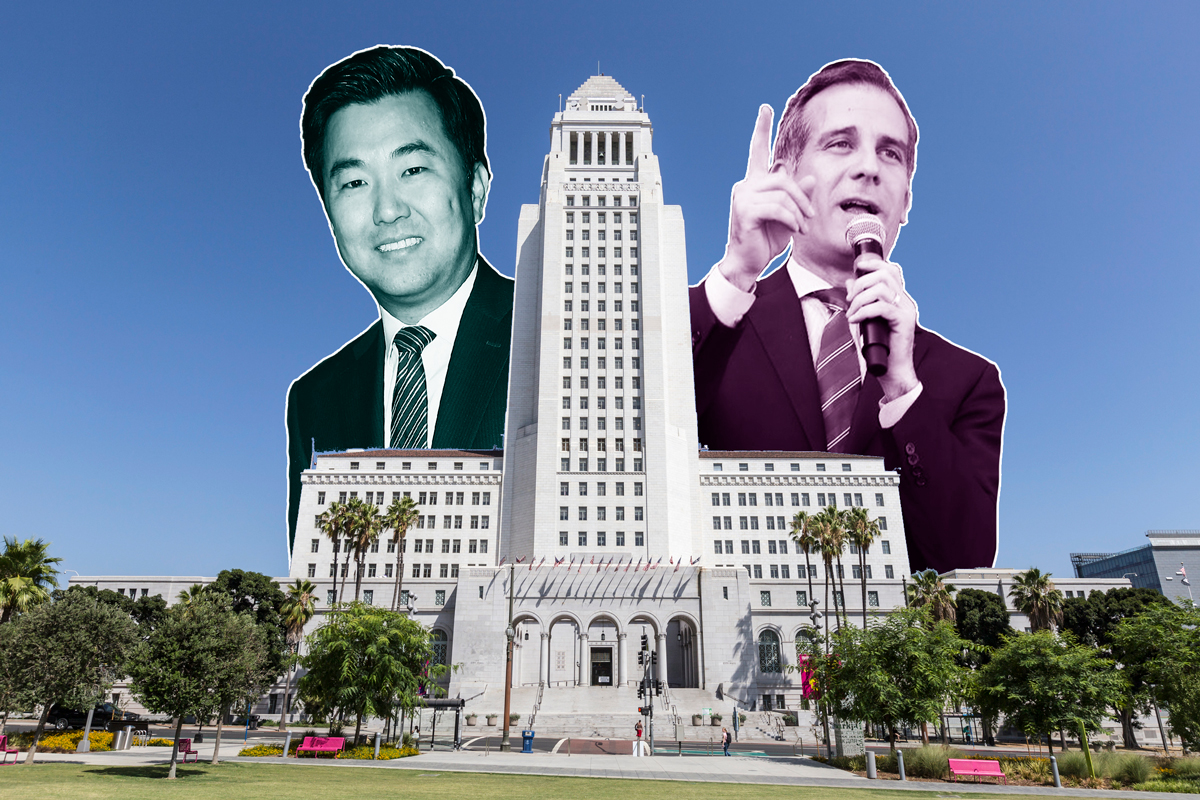A City Hall-supported ballot initiative that would impose a new square footage tax on properties. A City Council proposal to ban developers seeking project approval from donating to a political campaign. Opposition to a state measure that would increase the density of residential construction but could also force out lower-income residents.
Those are some of the measures Los Angeles elected officials are now pushing or pushing against, which would hit the real estate industry particularly hard. The moves come amid the city’s search for more tax revenue, and as the real estate developers and companies come under increasing scrutiny following a scandal over donations.
On June 4, L.A. voters will decide on a new square footage tax through Measure EE, which would fund the city Unified School District. If passed, the measure would tack on 16 cents for every square foot of enclosed space, and apply to homes, apartment buildings, industrial space, hospitals, and offices.
Mayor Eric Garcetti strongly supports the proposal and touted it in his State of the City address last month.
While city officials say it could raise $500 million a year for the school district — offsetting the district’s annual deficit — owners of large properties say they are being unfairly targeted.
Aaron Taxy of the Building Owners and Managers Association of Greater Los Angeles said Measure EE was “rushed” through, and without the commercial real estate industry having been consulted. BOMA, which represents commercial property owners, opposes the initiative, preferring instead a flat parcel tax.
The proposed measure would add to a handful of taxes and fees the city has imposed on developers and property owners over the last few years. Voters last year approved a tax of 2.5 cents per square foot on water impermeable space, such as parking lots. The money, which pays to capture stormwater and fund water quality improvements, takes effect in July.
In late 2017, the city instituted a “linkage fee” of between $1 and $18 per square foot on new developments, based on their type and location. That will fund affordable and inclusionary housing developments in a city where the need for lower-cost housing has reached crisis level. The fee has been implemented in phases and will take full effect next month.
The Council, meanwhile, is under intense pressure to rein in the real estate industry’s political influence at City Hall following a donations scandal centered around Downtown L.A. City Councilman Jose Huizar.
The FBI is investigating a series of contributions developers made to Huizar, his wife’s now abandoned bid for his City Council seat, and to affiliated causes. The investigation has widened over the last several months, leading to the resignation of some city officials whose names appeared in a leaked FBI search warrant.
Real estate firms that appear to be of interest in the investigation include Greenland USA, Related Companies, and Skanska.
In response, a group of Councilmembers led by David Ryu resurrected a proposal to ban developers or anyone else seeking approval for a building project from making political donations to city officials and their personal charities.
Rebuilding trust
Ryu drew up a similar plan in early 2017, but it never made it out of its first committee. Last month, the Council ordered the City Attorney to draft two versions of the ban for a potential vote. One would only prohibit donations from legal entities that own properties where developments are planned. The other is broader and could prevent any members on a development project team — including architects and consultants — from donating money.
Mark Pampanin, a spokesperson for Ryu, said the measure is about “rebuilding trust in local government” with voters. The distrust that now exists, he said, “is rooted in a perception of outsized developer influence.”
Until that perception is addressed, he said in an email, “we cannot rebuild that trust.”
L.A. officials extend their influence beyond the city limits.
Local lawmakers oppose a plan from state Sen. Scott Wiener, who wants to upzone properties near transit, a move that would turbocharge housing construction statewide.
Lobbying for real estate projects is big business in L.A. Last year, developers spent a collective $65.6 million sending lobbyists to City Hall to garner support for developments and to argue against policies that could hurt the industry. Statewide, the real estate industry’s power was apparent last year, when it poured money into opposing the referendum that would have allowed for sweeping rent control measures. Proposition 10 failed at the ballot box.
Senate Bill 50 could provide a major boost for developers, with about 40 percent of L.A.’s developable land seeing more dense zoning. But opponents say the measure would lead to gentrification, strangling small neighborhoods and forcing out residents with larger, pricier developments.,In April, the Council authorized city-funded lobbyists to work against the bill in Sacramento. SB 50, they argued, would essentially override local zoning, giving city officials and Council members less say over what gets built. In that case, the power shift would lean to developers.
